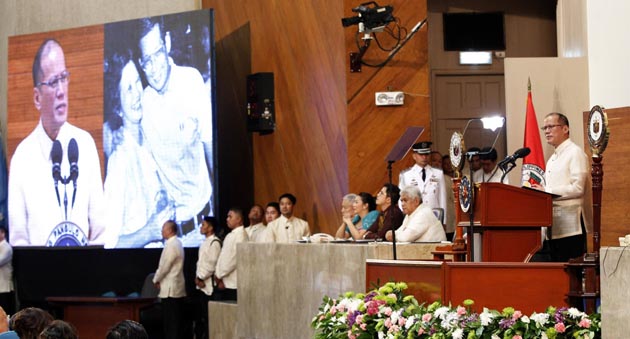
This week Philippines President Benigno Aquino delivered his much-anticipated State of the Nation Address. In the 6-year term arrangement for Philippines’ presidencies, this was Aquino’s last State of the Nation Address, and the country goes to the polls in May next year. The State of the Nation Address is aimed by incumbent Philippines’ presidents to deliver a theme message, above the white-noise of everyday politics, directly to the people, and the television speech is widely watched. Indeed, it is a formal and celebrity event, attended by the many glamorous politicians’ wives and quite a few glamorous women politicians.
Aquino made the case for the legacy of his presidency: to run government without corruption. In his term Aquino has pushed two laws that he inherited - a ‘plunder’ law, which acts strongly against theft of public monies by those in public office; and a whistleblower law, which protects those who report the theft of public monies by those in public office. And it is internationally acknowledged that corruption in the Philippines has been much reduced under Aquino.
Having evidenced this success, Aquino went on to hammer home the implication of lower corruption: when corruption is reduced an economy can flourish. And the Philippines’ economy certainly has flourished under the Aquino Administration, with 6 percent becoming the norm for annual growth in Gross Domestic Product.
As taxation revenues have risen, and pork-barrelled expenditure restricted, the state of public finances are healthy. The country’s needs for new capital works have been moderately met by the introduction of a workable Public Private Partnership (PPP) policy, although the Government’s cautious approach to PPP has limited the role that this has played so far. Still, some significant highways have been constructed, with more on the drawing-board, and a neatly designed school-classroom construction and maintenance program has led to a rapid reduction in the shortfall in new classroom supply.
However, Direct Foreign Investment into the Philippines has not added to new project initiatives a great deal, with the level of foreign investment still quite low compared to neighbouring countries. Limits to majority foreign ownership explains this, and there may still be a lingering concern about whether the old corruption problems have gone for ever.
The second theme which got Aquino into power was ‘inclusive growth’, a major issue in a country with dire poverty problems, and minimal social safety-nets. The number of people, including children, living on the streets of Manila suggests that many have still not benefited from the ‘inclusive growth’ that a healthy rise in GDP should have allowed. A standard ‘trickle down’ expectation has certainly allowed many families to enter middle-class status, but huge numbers, notably in agriculture areas, have not yet felt the impact and, while the unemployment rate appears OK, the under-employment rate tells a less happy story. Aquino has introduced some modest government social programs to target the worst-off families, but the sums are spread thinly in a country which is fast approaching 101 million people.
However, Aquino has pushed education improvements strongly and even his most stern critics concede that education has improved during his term. When Aquino came to power, the children-to-textbook ratio was as high as 5:1 in the worst schools, the children-to-classrooms ratio was as high as 300:1, and the children-to-teachers ratio was as high as 400:1. These ratios are now far better. In combination with other (post-school) education initiatives, it is hoped that the next generation will be better-prepared for the workforce and for life.
The problems which have not seen much progress are agrarian reform, the efficiency of agriculture, the low wages of agricultural workers and the aging of those workers. Public transport has seen little progress. The opportunities for attracting manufacturing industries away from China with its rising wage rate has only just begun. And a new problem is growing: the prevalence Shabu - 'ice' or crystal meth - with all the associated damage to lives and crime rates in a country awash with hand-guns.
Still on Aquino’s wish-list is a peace treaty (the Bangsamoro Basic Law) with the Moro Islamic insurgents in southern Mindanao. There seems little alternative to a Treaty, but public support for it has been soured by the death of 44 police officers in an incident with Moro fighters in Mamasapano in January. And Aquino has added a new priority: an ‘anti-dynasty’ law which would stop family members of politicians from easily getting onto the political gravy-train themselves.
In the USA, President Obama seems determined to end the assumption that an incumbent president’s last year is a ‘lame-duck’ period. It is possible that President Aquino will also defy this description over the next 10 months.
While Aquino has not publicly endorsed a candidate for the May presidential election, it is pretty clear that he favours Mr Mar Roxas, the Secretary for the Interior & Local Government, who is a member of his own political party, and considered experienced, competent and clean.
The May 2016 election is important in achieving the further progression of anti-corruption and pro-growth policies in the Philippines. In his speech, President Aquino pointedly said, “will everything that we have invested, everything that we have labored for, vanish in just one election?”
Mike B. Bradshaw has been an officer of the Treasury, Canberra, an investment banker, and a consultant in Europe, the USA and Asia. He now works on project financing.
Mike B. Bradshaw
edit@hanhodaily.com

